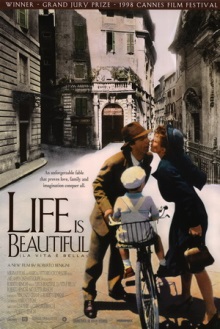
I’ve never seen Life is Beautiful but I have heard about it. Unfortunately while dropping by the in-laws’ house recently, I couldn’t help but catch glimpses of a Chinese television show whose entire point seems to be to provide summarized digests of chosen films. This meant that the film was effectively spoiled for me before I ever watched it.
Despite having previously seen it, my wife asked to watch it again and so here we are. To its great credit, despite key scenes being spoiled and despite having a pretty good general idea of its story, Life is Beautiful still managed to retain for me most of its emotional punch. At the same time, there’s no denying that it is endlessly entertaining and at times genuinely funny.
This, of course, is in large part due to the effectiveness of Roberto Benigni’s performance. It’s dicey though. I see how some may be turned off by the blatant silliness of his antics. To enjoy this film, you need to be willing to let it the set the mood. It tries to do this from the opening moments when the narration calls this a “fable” that is filled at once with sorrow but also wonder and happiness.
As in any fable, you also need to be willing to suspend your sense of disbelief. If you were inclined to nitpick, you would probably be annoyed by how Benigni’s character woos his love with a succession of contrived coincidences or how the film never shows you how he weathers the consequences of the numerous disasters his antics cause. But if you buy into the fantasy, then it’s a fun ride thanks to Benigni’s great comedic timing.
Another thing that elevates this film above the norm is that while it mostly shies away from directly confronting the horror of the Nazi regime, it constantly reminds us that the horror exists in all sorts of small ways. From the defaced horse to how the party guests treat the question of how much it would save the state if all the cripples were killed as merely mathematics to how the German doctor is so obsessed with riddles that he completely fails to acknowledge the truth of what is happening, these details serve to anchor the fantasy in reality.
Following the release of this film, it seems that some parties were upset at how it used the Holocaust as a subject for humour. I disagree with these objections since the film maintains nothing but the utmost respect for the tragedy while the humour, as Rogert Ebert wrote, serves as a weapon against the Nazis. A better question, I think, is to ask whether or not it is wise to go to such extreme lengths to coddle a child in innocence instead of preparing the child to survive whatever happens.
Life is Beautiful is of course a mass-market, commercial crowd-pleaser and I understand that some film snobs look down on it for this reason. But it’s also a fine film and there’s is no reason to be ashamed of liking it. I’d recommend it highly.
very nice and beautiful movie.